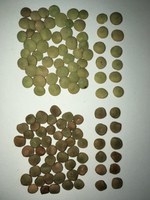Certified Seed Reduces Impact of Vetch in Lentil
(Click the image below to view a high-resolution image that can be downloaded)
North Dakota leads the nation in lentil production, but in the last several years common vetch (Vicia sativa) has become a problem for some lentil producers. Common vetch, often referred to as rogue lentils, can be introduced by seed.
The North Dakota State Seed Department strongly encourages lentil producers to plant certified seed to control this weed and minimize economic losses.
Common vetch is an annual legume with a plant morphology similar to cultivated lentil, hence the name rogue lentil. Leaves of both plants are similar in appearance but common vetch leaves are usually larger. Common vetch plants are also larger, taller and more vigorous than lentils. Flowers are more conspicuous, purple and produce seed pods which are larger than lentil, more similar to those of a pea.
Seeds are similar in shape and size to lentil which makes separation during conditioning a challenge. Seeds are often darker brown and have a blockier appearance compared to the lens-shaped seed of lentils.
Due to the similarity in seed characteristics, common vetch seed in lentil is classified as inconspicuous admixture during grading which, if present at a high-enough level, will result in a lower grade, impacting market acceptance and price. The limit for U.S. Grade 1 is 0.5 percent.
“We have heard of significant levels of contamination, exceeding five percent, in some lentil loads last year,” says Steve Sebesta, N.D. State Seed Department deputy seed commissioner.
“The N.D. State Seed Department has received one common lentil sample so far this season that contained a significant level of common vetch seed. No certified seed samples tested thus far have contained any common vetch.”
To limit the introduction of common vetch in lentil fields, the N.D. State Seed Department recommends that producers:
- Plant certified seed. Since common vetch can be introduced through contaminated seed sources, producers are encouraged to purchase certified seed from a reputable seed supplier every year. Due to the similarity in plant and seed characteristics, lentil producers may be unaware they have a contamination issue on their own farm. Consequently, farmer-saved seed and common seed may contribute to the problem. Seed certification utilizes field inspection by qualified inspectors as well as laboratory testing to ensure the seed meets minimum standards for varietal identity, purity, germination and the absence of seed-borne diseases such as Ascochyta. Certified seed is the best tool producers have to ensure high-quality seed.
- Test saved seed. The department highly recommends that any lentil seed saved for the purpose of replanting be tested for purity as well as germination and Ascochyta to determine the suitability for seeding purposes. Submit samples to the N.D. State Seed Department for testing.
- Insist on legal seed. According to state seed law, all agricultural seed sold in North Dakota, regardless of whether it is certified or common, must be properly labeled. Since common vetch is not a noxious weed, it does not need to be identified by name on a label. However, consumers have a right to ask for an analysis report for a seed lot which identifies each weed species found in a sample of seed that has been tested.
Sebesta adds, “Lentil producers are fortunate to have in their toolbox an easy solution to the common vetch problem to help protect the marketability and profit potential of their crop. Purchase certified seed from a reputable seed supplier to ensure the best possible quality.”
For a list of field-inspected lentil varieties eligible for final certification, check the 2017 North Dakota Field Seed Directory, visit http://www.nd.gov/seed/ and click on Field Seed Directory, or check the 2017 Seed Guide.
NDSU Agriculture Communication - Jan. 26, 2017
| Source: | Steve Sebesta, 701-231-5400, ssebesta@ndseed.ndsu.edu |
|---|---|
| Editor: | Kelli Armbruster, 701-231-6136, kelli.armbruster@ndsu.edu |


